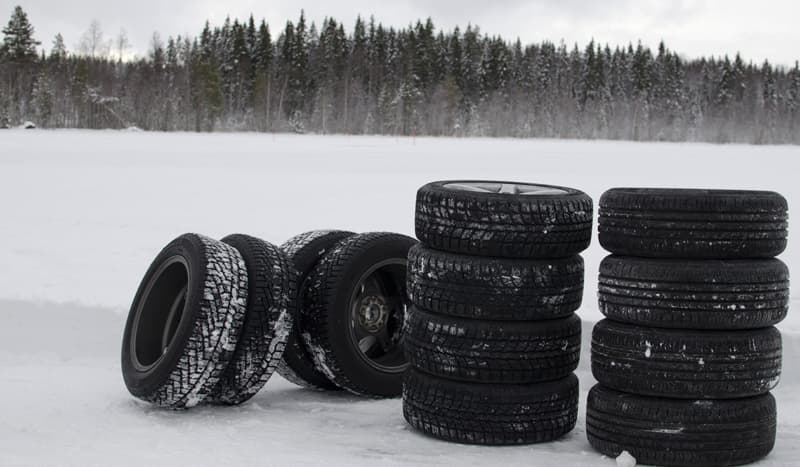What Is The Difference Between Winter Tyres And All Season Tyres?

Is it worth investing in winter tyres? What can they add to your car that normal tyres cannot?
If you are considering buying a new set of tyres for your car or for another vehicle to see you through the harsh winter road conditions, you may wonder what the difference is between winter tyres and all season tyres. It’s certainly a very good question; tyres can be very expensive to buy and you will want to make the right decision to suit the requirements of your vehicle and the road conditions that you are likely to encounter, without breaking the bank. With so many different variations of winter tyres and all season tyres available on the market, choosing the right ones for your vehicle can be a difficult decision.
The Difference
So what exactly is the difference between winter tyres and all season tyres? Let’s start with explaining how all season tyres work. Generally speaking, all season tyres are fitted as standard on the majority of new cars, they are specifically designed to meet a wide range of road conditions. All season tyres combine deep water channels for good traction in wet conditions with a harder, tougher rubber compound that provides longer tyre life in warm weather. As all season tyres are very adaptable, they are a popular choice for many drivers and can prove to be a cost-effective solution.
Specialist Tyres
However, if you tend to drive on extremely harsh road conditions; for example off-road lanes, or in extreme ice/snow conditions, you may need to purchase a special pair of winter tyres. Specialist winter tyres are designed to perform optimally in icy, wet and snowy weather conditions. Winter tyres have optimised handling and traction, allowing them to adapt well to wet conditions, while also being suitable for dryer road conditions. To this end, if you drive a larger vehicle, or you have to drive in rural areas, winter tyres can be the best option to prevent slipping and potentially getting stuck in the snow.
Snow
Specialist winter tyres can be a brilliant option for anyone who wants additional reassurance while driving in adverse conditions. Years ago, people tended to use wheel tracks/chains when driving in the snow or ice, however, it can be a hassle having to attach and remove tyre chains according to road conditions. For example; you may find that one part of your daily journey is particularly difficult to navigate (unmade or very steep lanes are a great example); however, the rest of your journey is reasonably easy to navigate (i.e.. motorways or main roads). To this end, the majority of winter tyres are designed to adapt easily to a number of road surfaces and conditions, so you won’t have to keep changing them.
On the other hand, if you are unlikely to experience very difficult road or weather conditions, you may decide to stick to all season tyres. As an example; if you tend to use your car primarily for commuting to and from work via the motorway, you probably won’t need specialist winter tyres. Before buying winter tyres or season tyres, you should consider the individual needs and requirements of your vehicle.
You Might Like
The Right Tyres For Winter Driving
Choosing the right tyres for winter driving is important and they are essential if you are driving in snow or icy conditions. Make sure you get the right grip and control this winter.Do I Need Winter Tyres?
As the temperature drops, whether you need winter tyres or not is a big annual question many drives ask themselves. See our guide to see why you do!What Tyres Are Right For You?
Did you know there are radically different types of tyres? Know which tyres you should be using at any one time.Any Difference Between Trade & High Street Paint?
You've probably asked yourself this before. What is the difference between trade paint and high street bought paint. Quality? Price alone? Find out exactly here.The Difference Between Vacuum Cleaners
Do you know the differences between types of vacuum cleaners and hoovers? From upright to cylinder, bagless to HEPA filters?
Useful Websites
- BlackCircles.com
UK tyre retailer offering fully fitted tyres to UK drivers including winter tyres. UK coverage and tyres up to 50% discount. - Tredz
From bikes to helmets, lights, clothing and more. Cycles for children including kids BMX. Tredz sells tyres, wheels, frames and components from Shimano, Campag and more. - Wheelbase Alloy Wheels
Wheelbase Alloy Wheels and Tyres, the official distributor of BBS, Team Dynamics, Wolfrace, BK Racing and Lenso in the UK. We stock alloys and wheels for all makes of car including Audi, Honda and BMW - C Tyres
Buy branded tyres cheap online at www.ctyres.co.uk. Carlisle tyres is the premier site for competitively priced tyres with a massive range of sizes available from leading brands. - Tyres Online
The very best magazine and consumer information base covering tyres, wheels, batteries, exhausts and automotive accessories - Just Tyres
The UK's leading independent tyre specialists, all brands fitted on your vehicle by expert technicians with the highest standard of service at highly competitive prices - Add Your Website Here